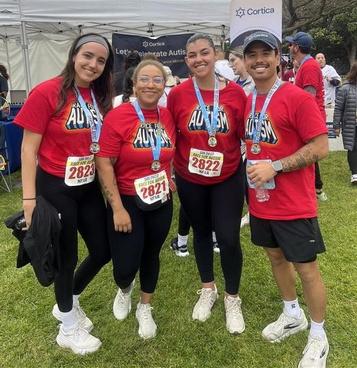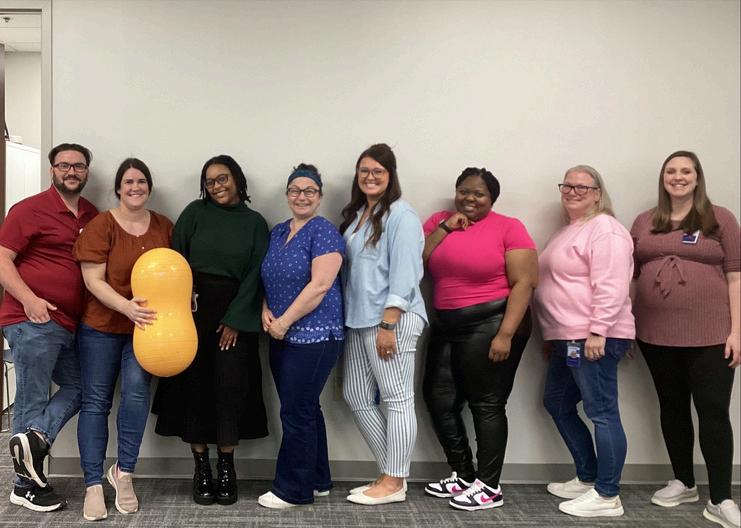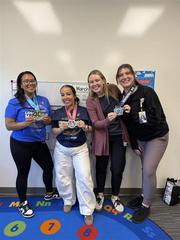CorticaFYI Newsletter
April2025




April2025



At Cortica, your well-being and safety are a priority for us. In the event that you are injured at work, please observe the following steps:
1.If you need emergency medical attention, dial 911
2.Report your injury to your direct supervisor
3.If you have a non-life-threatening or non-emergent injury, contact our Nurse Triage Line at 1-833-541-5612 to speak with a registered nurse
4.Complete the serious incident report (SIR), available on the Cortica SharePoint homepage under the Important Documents section
If you have any questions, please create an HR help desk ticket.
At Cortica, it pays to know the right people! We offer bonuses of up to $500 for each successful teammate referral, paid 90 days after the referral’s hire at Cortica.
As outlined in this short video, there are two easy ways to refer: By submitting a referral in Greenhouse Recruiting or sending a link to the person being referred.
To get started, head to our internal job board and view our open positions.


We’re kicking off Spring Cleaning Week soon, using a daily theme to help focus our efforts at each center:
Monday, April 28: ABA rooms
Tuesday, April 29: DT rooms and OT gym
Wednesday, April 30 Team rooms, conference rooms, medical rooms, and kitchen
Thursday, May 1: All closets (toy, storage, supply)
Friday, May 2: Final discard day
Our color-coded sticky system will determine which items should stay in the center and which items should be discarded or donated:
Green: Use this for items that are in good, functional condition and are regularly used.
Thanks for helping us create clean and welcoming spaces for families, teammates, and guests!
Yellow: Use this for items that have missing pieces or batteries that need to be replaced, or items that have minor damage but are potentially fixable.
Red: Use this for items that are broken, damaged beyond repair, dangerous to use, expired (e.g., medical items, food, cleaning supplies), or no longer useful.
On the Wellness Teams channel this month, our Wellness Committee has invited teammates to get moving and enjoy the outdoors during themed Step into Spring Challenge walks. Teammates including ABA supervisor Landi Shaanah (whose image is shown at right) are sharing photos of their adventures, and prizes are available for teammates whose posts receive the most engagement.

In honor of Mental Health Awareness Month in May, our Wellness Committee will host a Mindfulness Monday series. This webinar series has been designed to help shift teammates’ focus away from daily stressors and enhance emotional health, with sessions hosted by counseling teammates Jaleesa Castrellon, LMFT, LPCC, Victor Macias, LPC, and others. Look for Outlook invitations to the series in late April.
Mindfulness enhances well-being, reduces stress, and improves focus. Wellness Committee co-lead Marielle Lenoir, LPC has created resources to support teammates on their mindfulness journeys, including:
Techniques to practice mindfulness in the workplace
Tips for integrating mindfulness into daily life
Strategies for using mindfulness to cultivate resilience
Actionable steps
Click here to watch Marielle’s presentation and learn more.
If you ’ re enrolled in Cortica’s UnitedHealthcare medical plans, the UHC Rewards and One Pass programs can empower you to improve your health and wellness.
UHC Rewards is a personal health and wellness program allowing teammates to earn up to $300 in rewards after completing health and wellness actions. These may include tracking 5,000+ steps, engaging in 15+ active minutes each day, tracking 14 nights of sleep, getting a biometric screening, and taking a health survey.
To learn more about UHC Rewards: Scan the code to the right to download the UnitedHealthcare app, sign in, select the menu tab, and choose UHC Rewards Visit myuhc.com, sign in, and select UHC Rewards

Teammates also have access to One Pass, a lower-cost, extensive nationwide fitness facility network that includes digital fitness options.
Eligible members may choose from four membership tiers based on their price, gym, and fitness studio preferences. Fitness facility options include large national gyms, independent fitness centers, and boutique studios, and members may use different facilities in the same month.
To learn more, visit www.onepassselect.com.
SharedbyHarperJeong, MEd,BCBA,LBA,Planoclinicalexcellencesupervisor
Our client began ABA services with Cortica Plano in 2022, when he was seven years old. At the time, he primarily used single-word requests, frequently repeated words and phrases from TV shows, and communicated by flopping, yelling, eloping, showing aggression, and crying.
The team focused on building his communication and joint attention skills and teaching him how to share and engage in activities with others. They expanded his play interests and leisure skills in ways that matched his preferences and developmental needs.
Our client loved singing Christmas songs, so the team turned that into a social activity! By singing together and creating 3-D Christmas-themed puzzles, they turned a solo activity into a shared holiday celebration. The client also enjoyed drawing animals, so the team used that interest to teach him how to follow multi-step directions. They supported him with building animals using clay, providing step-by-step instructions.
When he repeated words or phrases he heard on TV shows, his care team encouraged imaginative play based on his favorite scenes and helped expand his expressive language and creativity. Through active modeling and offering alternatives, they empowered the client to accept changes and even find joy in a "Plan B" solution.
To help teach him that his voice matters, the team began initiating single-word requests and gradually expanded his language with sentence starters, visual aids, and a whiteboard offering choices of phrases he could use. He has learned that he canrequest what he wantsand can refuse what he doesn't want.
His caregivers fully participated in training sessions and helped foster his independence in daily routines. At home, he now completes hygiene and self-care routines like brushing his teeth, washing his face, taking a shower, and demonstrating appropriate mealtime behavior, all independently or with minimal support.
Our client will turn 11 this summer. He participates in Cub Scouts, plays games with his peers, and loves to try and learn new activities. He uses phrases with four or more words to make requests, negotiates alternatives when his favorite things are unavailable, and engages in problemsolving. His weekends are now filled with joyful family outings and shared experiences.
The team continues to support his growth in language flexibility, adaptability, and social engagement. His journey is a beautiful example of what’s possible when expertise, compassion, and teamwork come together!
Whether you ’ re driving to your next Cortica appointment, running errands, or going on a fun outing with friends or family, distracted driving is a dangerous habit that can prevent you from arriving at your destination safely. A few simple steps can reduce the risks for yourself and those around you.
Distracted driving can occur when you take your mind off driving, take your hands off the wheel, or take your eyes off the road. Trying to find the perfect song on your playlist, programming your GPS, eating, looking at apps, reading text messages, engaging in personal grooming, reaching into the backseat for an item, allowing pets to ride in your lap, or simply zoning out are all activities that can slow your reaction time and cause collisions.
To ensure a distraction-free drive:
Program your GPS, start your playlist or audiobook, and finish eating and drinking before you start driving
Enable your phone’s do not disturb feature, so you won’t be distracted by notifications
Never drive and use your phone at the same time, even if you ’ re using hands-free features
Avoid looking at your phone when you ’ re at red stop lights
Use your cell phone only when you are safely parked
Avoid staring at accident scenes when passing them
Slow down when driving through a construction work zone
We at Cortica want to make sure that you arrive at your destination safely. Remember: When you ’ re behind the wheel, your only job is to drive!
April 2025
Natalie Alford, behavior technician, Dedham
Maxwell Augustson, behavior technician, Westlake Village
Kailey Baier, front office administrator, Naperville
Stephen Beck, occupational therapist, Marin
Kelcie Berge, speech-language pathologist III, Glendale
Dylan Boggs, behavior technician, Scottsdale
Annie Boon, substitute behavior technician, Laguna Niguel
Karla Cabrera, behavior technician, Torrance
Sydney Cooperman, behavior technician, Burlington
Brian Cunnington, behavior technician, Carlsbad
Ariana Deanda, medical assistant, Scottsdale
Danielle Decastro, ABA supervisor, Torrance
Lee Hamilton, behavior technician, Irvine
Rebecca Holley, speechlanguage pathologist, San Diego
Keri Isara, occupational therapist, Torrance
Katrina Jarvis, behavior technician, Shrewsbury
Jessica Jean-Baptiste, behavior technician, Trumbull
Harper Jeong, clinical excellence supervisor, Plano
Peyton Longo, behavior technician, Warren
Alexia Lopez, behavior technician, The Woodlands
Yvette Martinez, behavior technician, Irvine
Berenice Mendez Reyes, behavior technician, Glendale
Kayli Moniz, clinical excellence supervisor, Westlake Village
Juliet Biton, ABA supervisor
Ashley Hebert, clinical excellence supervisor
Erika Perkins, clinical excellence supervisor
Lisa Pogge, head of expansion
Megan Tarvydas, clinical excellence supervisor
Jennifer Montes, behavior technician, Westchester
Alyssa Newsome, behavior technician, Marin
Osvaldo Ochoa, behavior technician, Naperville
Kerry Peters, occupational therapist, Westchester
Kara Posey, behavior technician, San Diego
Rachel Reilly, BCBA, Burlington
Jason Robles, behavior technician, Carlsbad
Felicia Rodriguez, site care coordinator, The Woodlands
Deborah Rosenzweig, speechlanguage pathologist, Cary
Katherine Saslawsky, music therapist III, Laguna Niguel
Abigail Vigliotte, behavior technician, Shrewsbury
Cheryl Williams, front office administrator, Plano
Savannah Ziba, senior behavior technician, West Springfield
Cadence Toth, ABA supervisor
Melanie Weaver, clinical excellence supervisor
“Cortica has been a breath of fresh air after years of mediocre medical care. The doctor listens to the parent and the patient to gather as much information as possible and comes up with a plan WITH the parent/patient.”
“The staff responded quickly and kindly, we saw a nurse practitioner quickly and now all of my son ' s evaluations and follow up appointments are set up! We've been looking to get our son the proper diagnosis. Cortica has made that possible!”
“I’m so grateful for learning about Cortica and their kindness, empathy and support already! Thank you for existing and seeing the other side of neurotypical…such a needed and welcomed resource!”
“Your doctors are amazing. They are very invested in my child. They take the time to listen and invite me to make the best decision we both can make for my son. ”
“My daughter has never wanted to go to the doctor previously and they make her feel so welcome and literally celebrate her walking in for her appointments. We feel heard as a family and having such a welcoming environment helps.”


May is Mental Health Awareness Month, an annual observance founded by Mental Health America (MHA) in 1949 to highlight the importance of mental wellbeing, educate the public, reduce stigma. and promote support for those affected by mental health conditions. Click here for MHA’s Mental Health Month Action Guide, which includes wellness tips and resources.
May is AAPI Heritage Month, which recognizes the significant contributions that Asian Americans, Pacific Islander Americans, and Native Hawaiians have made to US history, culture, and achievements.